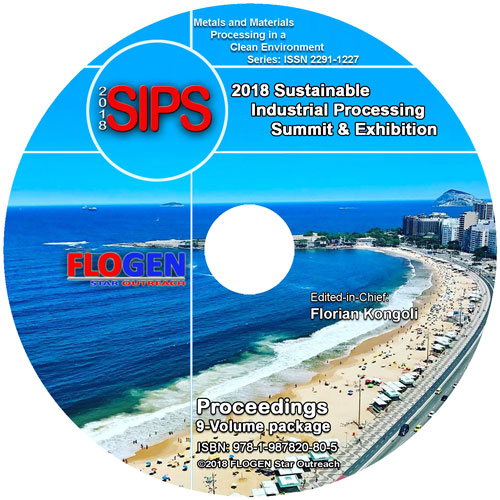2018-Sustainable Industrial Processing Summit
SIPS2018 Volume 8. Composite, Ceramic, Nanomaterials and Mathematics
| Editors: | F. Kongoli, M. de Campos |
| Publisher: | Flogen Star OUTREACH |
| Publication date: | 23 December 2018 |
| Pages: | 184 pages |
| ISBN: | 978-1-987820-96-6 |
| ISSN: | 2291-1227 (Metals and Materials Processing in a Clean Environment Series) |

CD shopping page
Steady Biomagnetic Flow Along a Nonlinearly Stretching Surface with Magnetic Dipole
Ferdows Mohammad1; Maria Mahbub2; E.E. Tzirtzilakis3;1, Dhaka, Bangladesh; 2M.SC STDENT, dhaka, Bangladesh; 3PROFESSOR, Patras, Greece;
Type of Paper: Regular
Id Paper: 354
Topic: 38
Abstract:
A mathematical analysis has been put forward that deals with, in particular, the flow of a heated Ferro-fluid over a linearly stretching sheet under the action of a magnetic field generated by a magnetic dipole [1]. Mathematical models have been developed for investigating the flow of a biomagnetic viscoelastic fluid over a stretching sheet, as well as in a channel with stretching walls under the action of an externally applied magnetic field generated by a magnetic dipole [2]. A great amount of significant work has been done on sheet stretched with nonlinear velocity. Fluid flow over a nonlinearly stretching sheet has been investigated [3]. In this study, the flow of a biomagnetic fluid over a sheet stretched with a non-linear velocity is studied with an applied magnetic field present in the fluid due to a magnetic dipole and heat transfer in the flow. This study mainly emphasizes the properties of biofluid flow considering two specified circumstances: one is magnetic field and the other one is non-linear velocity of the stretching sheet. Nevertheless, the magnetic field that has been produced by the dipole is strong enough to saturate the biomagnetic fluid flow. A non-linear system of ordinary differential equations has been introduced with some appropriate boundary conditions. They will be consistent with the principles of Ferrohydrodynamics (FHD) and Magnetohydrodynamics (MHD). Through performing non-dimensionalization in the variables involved and then by solving them using a suitable dsolve routine in Maple software graphical representations are produced to show how the flow properties vary with some dimensionless parameters. The parameters that have effects on them are Prandtl number (Pr), biomagnetic interaction parameter (B) and nonlinear stretching parameter (n). After comparing with previously published work, the achieved results seem to be in good agreement. Hopefully, this study is helpful for more accurate understanding of blood flow in human body suffering from arterial or vascular diseases.
Keywords:
engineering; physics; Mathematics;References:
[1] E. E. Tzirtzilakis and N. G. Kafoussias, Biomagnetic fluid flow over a stretching sheet with nonlinear temperature dependent magnetization, Zeitschriftfur Angewandte Mathematik und Physik, 54(4), 551-565 (2003).[2] J. C. Misra and G. C. Shit, Biomagnetic viscoelastic fluid flow over a stretching sheet, Applied Mathematics and Computation, 210(2), 350-361 (2009). 41) K. Vajravelu, J.R. Cannon, Fluid flow over a nonlinearly stretching sheet, Applied Mathematics and Computation, 181(1), 609-618(2006).
[3] K. Vajravelu, J.R. Cannon, Fluid flow over a nonlinearly stretching sheet, Applied Mathematics and Computation, 181(1), 609-618(2006).